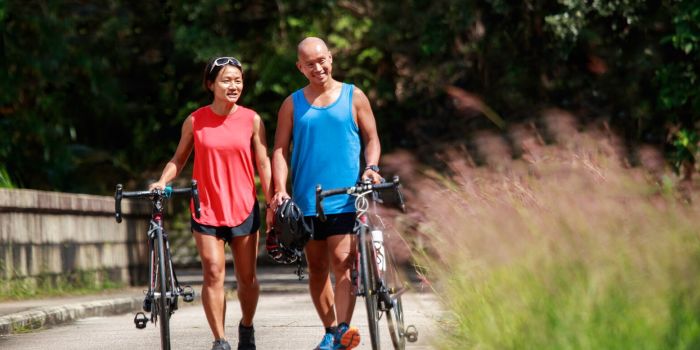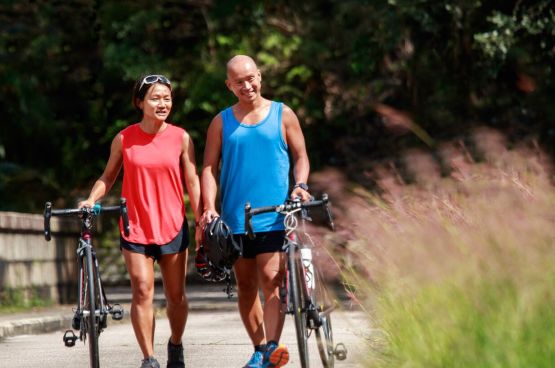How to exercise safely in the heat
Exercise provides you with many health benefits such as having more energy and better sleep. But, what about when the temperature rises? Is it still safe for you to work out when it is warm outside? Here I will explain what happens to your body when you exercise in hot weather, and how to do so safely in the heat.

What happens to your body when you exercise in hot weather?
Exercise causes your body temperature to rise, however warm it is outside. But when you exercise in hot weather your body needs to work extra hard.
This is because your body sends more blood towards your skin to try to keep you cool. When this happens, your heart beats faster than it would in cooler temperatures.
Your body also produces more sweat to try and cool you down. When it is very warm or humid it’s harder for your sweat to evaporate. This can cause your temperature to increase even more – making dehydration more likely too.
You may still be able to exercise in the heat if you make a few changes to where and when you work out.
How to exercise in the heat
Checking local weather forecasts and government guidelines can help you to prepare for hotter weather. When it’s hot outside, it may be safer to exercise early in the morning or later in the evening when the temperature is lower.
If you are not used to exercising in the heat then ease into working out, by starting at a lower intensity and taking more breaks than usual.
Other tips include:
- reduce the length of your exercise – your body will be working harder than usual so you might feel tired more quickly, even if you are used to regular exercise. Reducing how long you work out for can lower your risk of experiencing any heat related illnesses.
- stay hydrated – if you are working at a high intensity – such as running or doing high intensity interval training (HIIT) style sessions, then consider using electrolyte drinks or tablets to rehydrate you and replace any lost minerals such as potassium and sodium.
- if you’re working at a lower intensity, make sure you drink plenty before exercising and drink little and often during exercise to keep you hydrated.
- wear lightweight, light-coloured clothing which won’t absorb the heat, and will help your sweat to evaporate.
- wear a hat and sunglasses to reduce your sun exposure, and don’t forget the sun cream.
You can be more likely to experience heat stress if you are elderly, pregnant, or have other health conditions. If you do have a medical condition which might make working out in the sun dangerous, then please see your doctor to get personalised advice.
How do I prevent heat stroke when exercising in the heat?
It is normal to feel warm, sweaty and a bit more out of breath when you are exercising in the heat. But there are some key signs to look out for to reduce your risk of having health issues. These include:
- muscle cramps
- feeling or being sick
- weakness and fatigue
- headaches
- excessive sweating
- feeling dizzy or faint
- visual problems
If you notice any of these symptoms, then you should stop exercising and find some shade.
Drink fluids and apply cool water to your skin. If you feel very unwell then get immediate medical attention as heatstroke can be serious if not treated quickly.
Alternatives to exercising in the heat
Sometimes, it might be too hot to exercise safely and enjoyably outside. For example, during a heat wave, or if you have gone to a hot and humid country on holiday.
Here, you might like to keep up with your exercise regime in a different way. You could try:
- exercising indoors if it is cool enough, by using an online video for guidance
- using the gym facilities where you are staying which might be air conditioned
- swimming at an indoor pool
- using resistance bands to do a range of strength building exercises
Do you know how healthy you truly are? Bupa health assessments give you a clear overview of your health and a view of any future health risks. You'll receive a personal lifestyle action plan with health goals to reach for a happier, healthier you.
-
Sources Sources
- Physical activity. Department of Health and Social care. gov.uk, updated March 2022
- Barakou, I., Sakalidis, K.E., Abonie, U.S. et al. Effectiveness of physical activity interventions on reducing perceived fatigue among adults with chronic conditions: a systematic review and meta-analysis of randomised controlled trials. Sci Rep 13, 14582 (2023)
- Exercise and sleep. The sleep foundation. sleepfoundation.org, updated October 2023
- Takeda R, and Okezaki, K. Body temperature regulation during exercise and hyperthermia in diabetes. Diabetes and its complications. intechopen.com, reviewed January 2018
- Sawka, M, Wegner, C, Young, A et al. Physiological responses to exercise in the heat. Institute of medicine. Ncbi.nlm.nih.gov, accessed July 2025
- Heat related illness. Patient professional. www.patient.info, accessed July 2025
About our health information
At Bupa we produce a wealth of free health information for you and your family. This is because we believe that trustworthy information is essential in helping you make better decisions about your health and wellbeing.
Our information has been awarded the PIF TICK for trustworthy health information. It also follows the principles of the The Information Standard.

More exercise and fitness articles
Did you find our advice helpful?
We’d love to hear what you think. Our short survey takes just a few minutes to complete and helps us to keep improving our healthy lifestyle articles.
Legal disclaimer
This information was published by Bupa's Health Content Team and is based on reputable sources of medical evidence. It has been reviewed by appropriate medical or clinical professionals and deemed accurate on the date of review. Photos are only for illustrative purposes and do not reflect every presentation of a condition.
Any information about a treatment or procedure is generic, and does not necessarily describe that treatment or procedure as delivered by Bupa or its associated providers.
The information contained on this page and in any third party websites referred to on this page is not intended nor implied to be a substitute for professional medical advice nor is it intended to be for medical diagnosis or treatment. Third party websites are not owned or controlled by Bupa and any individual may be able to access and post messages on them. Bupa is not responsible for the content or availability of these third party websites. We do not accept advertising on this page.







